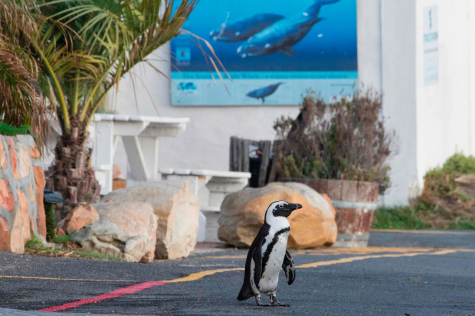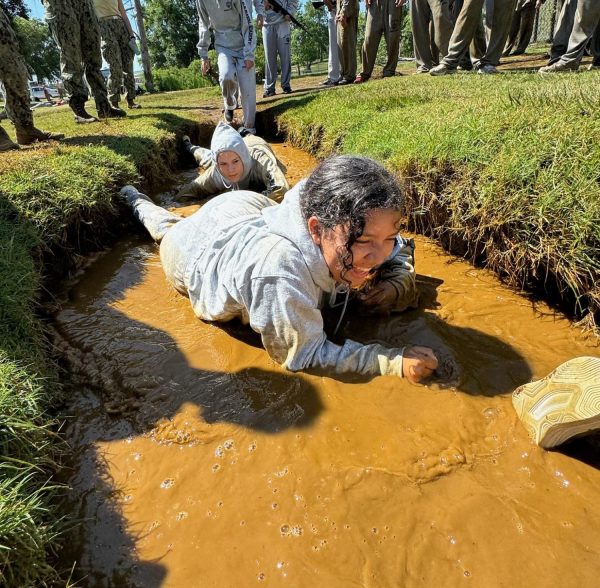The Unexpected, but Temporary, Benefit to Lockdown

As people all around the world are tucked away in their homes in lockdown, the world around us is growing greener and cleaner. The animals all around the world are starting to come out, African penguins are parading the streets of Cape Town, deer are gathering around shops in Japan, and pigeons have taken over the Taksim Square in Istanbul. All of this is due to the massive decrease in carbon emissions in the air. The coronavirus, according to Carbon Brief, has shown to have the biggest impact on the overall global emissions over all other pandemics and economic crashes.
While under complete lockdown in china, china decreased their amount of carbon emission due to electricity has decreased by 25% in a 4-week period, now with production picking up once again, carbon emission is still down by 18%. In the United States, greenhouse gases have dropped by 7.5%. It is estimated that greenhouse emissions in Europe would decrease by 22.4% due to lockdown. IN other words, it is estimated to have a 388.8 million ton decrease in greenhouse gases. Originally, around this time last year, it was estimated that there would be a rise in global carbon emissions from fossil fuels and cement production in 2020, but due to the pandemic, it is estimated that emissions would fall by 5% or 2.5bn tonnes of CO2, the lowest it has been in a decade. This is due to the decrease in flights, oil, and coal production, as well as a substantial decrease in the number of people driving.
Our initial @ICIS_energy modelling of the #COVID19 impact on European power & carbon markets shows substantial drop in #EUETS emissions as well as power & carbon prices for 2020 and beyond.
Full analysis here: https://t.co/RrjJyRfEq9 #energymarkets #emissions #coronavirus #OCTT pic.twitter.com/23Iy4dmet8— Marcus Ferdinand (@MFOslo) March 27, 2020
Aviation accounts for 2% of the world’s overall global emissions, although 2% seems very minuscule, that 2% represents 42 billion tonnes of carbon dioxide. In order to comply with travel bans and quarantine restrictions, many airlines have stepped forward and have decreased their flights. Individual airlines, as well as the TSA, have reported a 96% decrease in air travel. An individual airline in Europe, The Lufthansa group decreased their flights to only 5%. It is estimated that as the travel bans continue, there will be an 80% decrease in greenhouse emissions from flights.
With fewer people having to commute to work, there is also a substantial decrease in the need for oil and gas, leading to the lowest oil and gas prices in history, with a 20-30 billion barrel decrease in oil consumption a day. In the first quarter of 2019, there was a1513 BOEPD (sum of daily oil produced, measured in barrels), in the first quarter of 2020, the average production has decreased by 19%, leading to only 1225 BOEPD. As imagined, due to the decrease in production, there had also been a decrease in greenhouse gases, which is estimated to be 8% by the International Energy Agency. This is considered to be the largest decrease in production as well as emissions since World War II.
With all of the decrease in greenhouse gases, air quality has gotten better in places such as China. Due to the lockdown, the amount of nitrogen dioxide in the air had decreased by 30%.

While in the US, there has also been a 30% decrease, as can be shown in the satellite images below.
In one of the most polluted cities, Los Angeles, air pollution has gone down so much that the notorious dark skies have cleared due to a 40% decrease in Nitrogen dioxide.
Although it is widely believed that once daily life returns back to normal, pollution will return at full throttle, there is still some hope. Many scientists such as Jacqueline Klopp from the university for sustainable urban development at Columbia university’s earth institute, hopes that more state governments will start to invest in industries that can lessen pollution, such as renewable energy and electric cars. In London, ecologist Simon Curry suggests that people should cut car dependency and increase their bike-walk commutes. In London as well, Mayor Anne Hidalgo plans to ban diesel cars and double bike lanes to promote a car-free city. It is also widely hoped that lockdown will spark a greater awareness of the environment around us and the need to keep it less polluted.
Unfortunately, once lockdown does end, the conditions will most likely return to how they were previously, however, there is hope that we can improve the conditions. We may not be able to control our governments, but we can control our decisions. So the next time you need to go somewhere, think about a greener way to approach it.
Your donation will support the student journalists of Carnegie Vanguard High School. Your contribution will allow us to cover our annual website hosting costs and fund field trips, competition fees, and equipment. We appreciate your support!

Hello! My name is Katherine. I'm a senior who is heavily invested in the rock genre and spends a little too much time playing around with photoshop.











m • Oct 15, 2020 at 10:37 am
I really liked your story